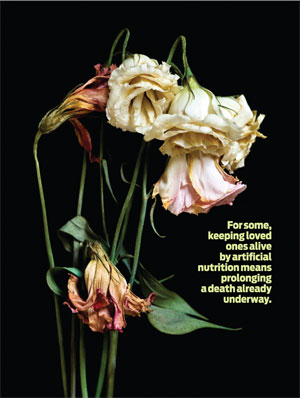Final Independence

Antibiotics, defibrillators, feeding tubes, and ventilators are lifesaving tools that sometimes become weapons to prolong life against our will. None of us wants to live for years in a nursing home rendered unconscious by late-stage dementia; or brain-damaged by strokes; or on and off ventilators with recurring pneumonia, growing so frail we lose the choice of an unfettered death at home. We grow determined in our wishes. We formalize end-of-life plans asking for comfort care only, no heroic, invasive, or futile medical procedures, no artificial food or hydration, minimal feeding. We assemble and legalize these plans. We calm our fears.
It sounds rational and safe. But in reality, the faith we place in legalized directives, or in the medical professionals charged with enforcing them, has proven unwise. Medical professionals ignore such directives, no matter how carefully we’ve crafted them, particularly if we end up in a hospital or nursing facility.
I’m not talking about assisted suicide. I’m talking about plans that specify withholding treatment, such as a ventilator, a feeding tube, or antibiotics for pneumonia, for a person who won’t recover, prolonging death even over fierce objections from family members. This situation results, in part, because directives go against the culture of medicine, which focuses on healing, on doing everything possible even if what’s possible proves futile. …
—
This article was originally published by Aeon Media (Aeon.co, Twitter: @AeonMag).
Purchase the digital edition for your iPad, Nook, or Android tablet:

To purchase a subscription to the print edition of The Saturday Evening Post: 